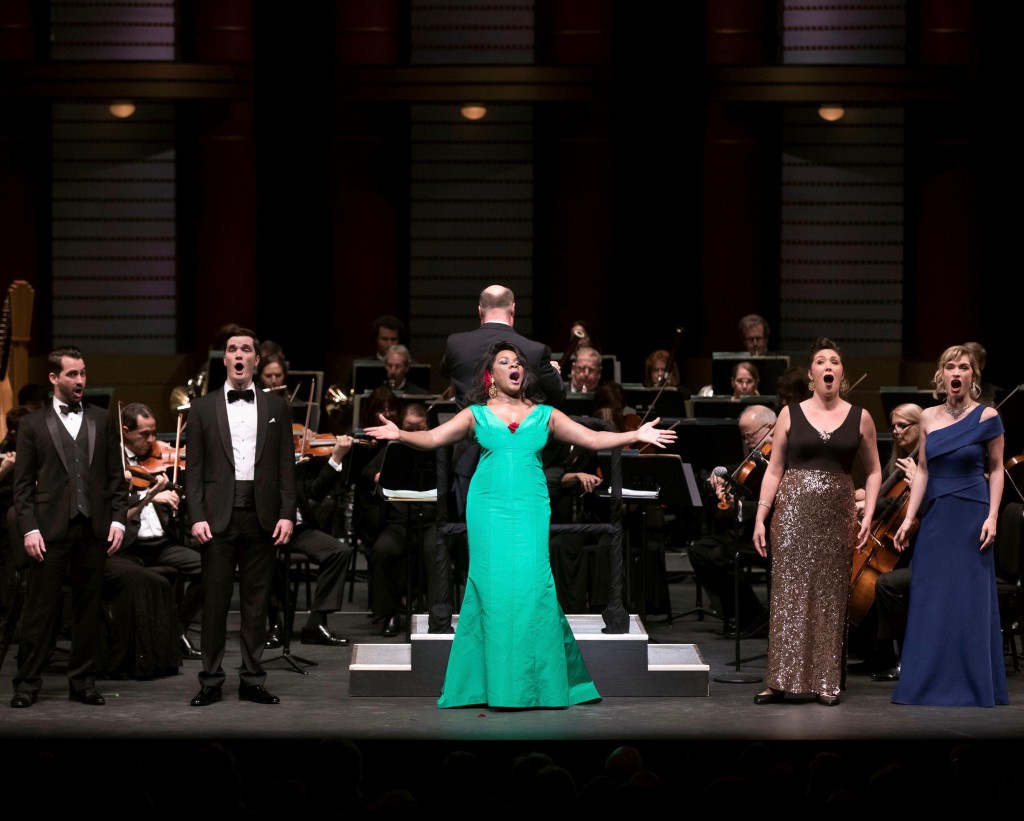With a late change of guest mezzo, Palm Beach Opera’s young artists strut their stuff at Kravis Center

Denyce Graves (center) performed with Palm Beach Opera young artists in a concert Tuesday night at the Kravis Center in West Palm Beach. Photo: Bruce Bennett
Palm Beach Opera showcased the singers of its Benenson Young Artist Program on Tuesday night with a program of familiar operatic excerpts at the Kravis Center. The originally scheduled guest artist Stephanie Blythe cancelled due to illness and was replaced by Denyce Graves. (Blythe is scheduled to sing the role of Prince Orlofsky in the PBO production of Die Fledermaus in March.)
Graves praised the opportunities the company gives to young artists, noting that she got her start singing the role of Mercedes in Carmen when she was a member of the Houston Grand Opera Studio, marking the beginning of a more than three-decade association with Bizet’s opera. Indeed the veteran mezzo-soprano was the Carmen of choice at the Met and many international houses throughout the 1990’s.
While she now mostly sings character roles (including a standout performance as the Old Lady in Bernstein’s Candide with Palm Beach Opera last season), she aptly demonstrated that she still owns the role of Bizet’s gypsy. In a playful rendition of the “Habañera,” her dusky lower register was in full bloom and she took total command of the quintet “Nous en tête une affaire.”( Members of the opera’s apprentice program for recent university graduates formed the chorus for the “Habañera.) Young artists members Sylvia D’Eramo, Natalie Rose Havens, Brian Wallin and Ben Schaefer were Graves’ well balanced colleagues.
In place of Blythe’s scheduled rendition of “Some People” from Gypsy, Graves offered a Gershwin medley, accompanied at the piano by conductor Gregory Ritchey. Wearing a stunning sequined gown, she sang a chesty “Someone to Watch Over Me” in a stylistic cross between diva and jazz vocalist. Graves added an improvised trill to a version of an “Embraceable You” bathed in warm tones and she really let “Somebody Loves Me” rip with blues-tinged abandon. Ritchey’s elegant pianism struck exactly the right note for these Broadway evergreens.
There were several exceptionally fine singers among the showcased young artists as well.
First and foremost was soprano Joanna Latini. Her clear high register was immediately manifest in “Parigi, o cara” from Verdi’s La Traviata, opposite the refined lyric tenor of Robert Stahley. She radiated both poignancy and fierce anger in “Piangeró la sorte mia” from Giulio Cesare by Handel. With harpsichord and strings providing idiomatic backing under Ritchey’s attentive direction, Latini’s top was clear as a bell and her lustrous middle register gave dramatic strength to Cleopatra’s lament. She was very much the lead in the Sextet from Donizetti’s Lucia di Lammermoor with Stahley bringing vociferous ring to the tenor line.
D’Eramo had the dipped-in-honey soprano timbre for the Vienesse gemütlich of “Marietta’s Lied” from Die tote Stadt by Erich Wolfgang Korngold. She caressed Strauss’s long-breathed phrases in the sisters’ duet from Arabella with well-matched soprano Emily Blair. On her own, Blair’s attractive light sound was not always under control or always audible in an English-language version of the “Czardas” from Die Fledermaus.
Stahley’s dulcet “Dies Bildnis” from Mozart’s Magic Flute was somewhat chilly and generalized in spirit. Schaefer had personality aplenty, to the audience’s delight, for “Largo al factotum” from Rossini’s Barber of Seville but his baritone sounded a size too small for Figaro’s catalogue of skills and duties.
Havens captured Santuzza’s desperation in “Voi lo sapete o mamma” from Cavalleria Rusticana, but her heavy vibrato and lack of focus between registers marred Mascagni’s verismo aria. Tenor Wallin, however, had the bright sound and deft touch for Rinuccio’s paean to the city of Florence from Puccini’s Gianni Schicchi. Ted Allen Pickell showed real musical theater aplomb with a bass-baritone of the type that used to adorn the Great White Way in a virile “If Ever I Would Leave You” from Camelot by Frederick Loewe.
The entire group joined Graves for a rousing “I Could Have Danced All Night” with some special lyrics about singing the evening away. Ritchey’s accompaniments were unerringly idiomatic, always helping the singers to make the best impression. The consistently excellent Palm Beach Opera Orchestra was in fine fettle throughout the ninety-minute program.
Palm Beach Opera presents Verdi’s La Traviata 7:30 p.m. January 25 and 26 and 2 p.m. January 27 at the Kravis Center in West Palm Beach. pbopera.org; 561-833-7888.
Posted in Performances
Leave a Comment
Wed Dec 19, 2018
at 12:26 pm
No Comments






